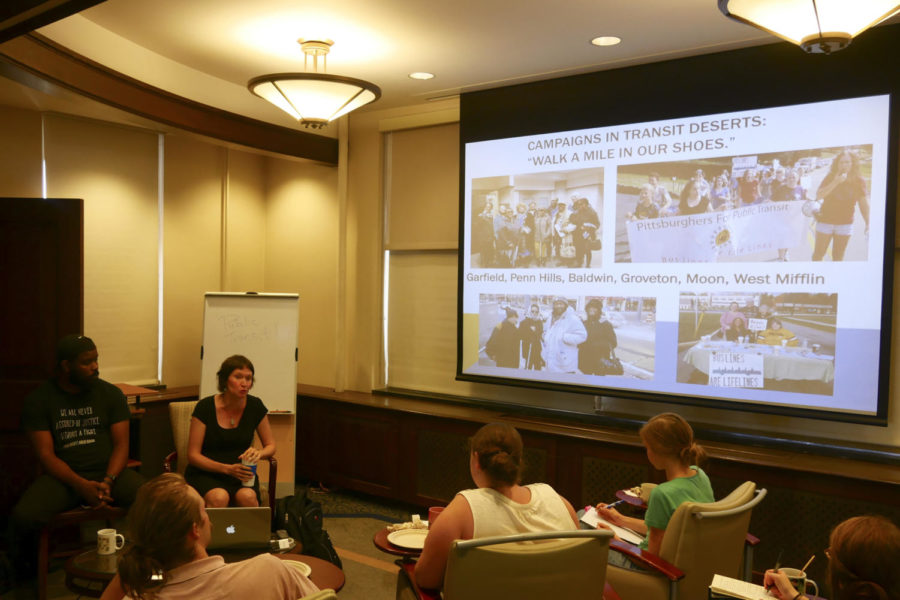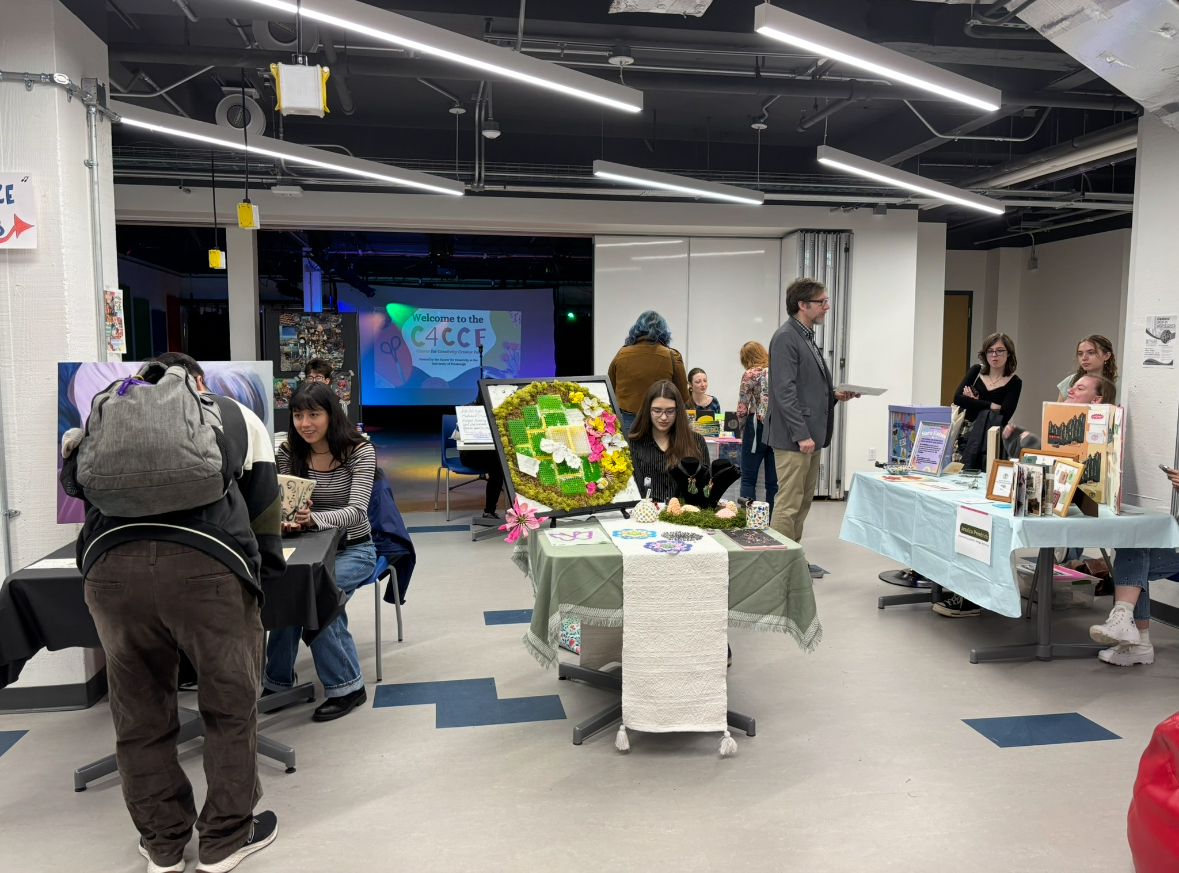Public Transit in motion at Community Cafe
Levko Karmazyn | Staff Photographer
Pittsburghers for Public Transit Director Laura Wiens spoke to about a dozen students Thursday afternoon about the group’s efforts toward more equitable public transport in Pittsburgh.
September 21, 2018
For many Pitt students, the plan for a new system of electric Port Authority buses will change the way they travel in the City. For Laura Wiens, it’s a victory.
“Public transit is a human right and a civil right,” Wiens told a group of Pitt students at Thursday’s Community Cafe. “It’s the connective tissue that allows people to access every other human need.”
Wiens is the director of Pittsburghers for Public Transit, a grassroots organization advocating for access to affordable transit across the City. For the past year, PPT has organized transit workers, transit riders and their communities to push for a more equitable plan for the Bus Rapid Transit system, which will send electric buses, running in their own lanes on Forbes and Fifth, between Oakland and Downtown beginning in 2021. According to Port Authority, the new version of the plan, unveiled in April of this year, prioritizes underserved communities instead of abandoning them.
Wiens and Joshua Malloy, PPT’s community organizer, spoke about their mission at the Community Cafe, hosted by the Honors College on the 35th floor of the Cathedral of Learning. Open to the public, the weekly program allows students and leaders in the community to come together over coffee and pastries.
Malloy’s black T-shirt bore a quote from activist Angela Davis in white capital letters — “We are never assured of justice without a fight.” After filling her own travel mug from the box of coffee, Wiens sat down with Malloy in front of about 15 students to discuss how PPT mobilizes grassroots action for more equitable public transit — which she called Pittsburgh’s “connective tissue.”
Pittsburgh’s ongoing gentrification has created “transit deserts,” Malloy said. Similar to its sister term, “food desert,” “transit desert” describes an area where access to public transit is limited or unavailable. Transit deserts in Pittsburgh are overwhelmingly found in minority neighborhoods like Braddock, Duquesne, McKeesport and Wilkinsburg.
“Black people who used to live in the City are being forced out to places that don’t have access to transit,” Malloy said. “You lose access to your job, because you have no way to get there. Or you lose access to your doctors, or your grocery stores.”
The original plan for the Bus Rapid Transit system, announced by Port Authority in 2017, looked very different. It would have halved the runs of all 61 and 71 buses and added mandatory Oakland transfers that would hurt commuters in those transit deserts, Wiens said.
“There was a built-in penalty for people living in low-income areas,” she said. “And the communities that were going to see these cuts weren’t even a part of the conversation.”
Resulting in backlash and a community meeting in Braddock to voice concerns, the Port Authority abandoned the plan. Now, PPT is focusing its attention on a fare equity campaign, which calls for equal bus rates and free transfers.
Though Wiens and Malloy come from different backgrounds — he grew up in a predominantly black, low-income neighborhood while she said she had “an immense amount of privilege” — they both have roots in labor organizing.
Malloy worked with Hospital Workers Rising, an organization crucial in pushing UPMC, the largest employer in the state, to raise its minimum wage to $15 an hour in 2016 — a huge gain for health workers in Pennsylvania, though Malloy said the effort to create a union is ongoing.
Wiens spent several years as a cook in a casino acting as what unions call a “salt,” helping the casino’s workers to unionize. The experience encouraged her to focus on ensuring that her work is about helping others have their voices heard — not talking over them.
She advised similarly privileged young people who want to make a difference to learn from her example and listen to the communities they want to help.
“You’re not that important,” she said. “What is important is mobilizing large groups of people.”
Malloy agreed, pointing to PPT’s successes as proof.
“It’s important to train people to advocate for themselves,” he said.
This is the crux of PPT’s strategy. In the case of Bus Rapid Transit, Wiens said, they went to the communities affected and helped them contact politicians and collect signatures on petitions.
“The residents in the community are also the leaders in the campaign,” Wiens said. “We go to them and we say, ‘These are the power players, these are different ways that we’ve seen people push before, what are you willing to do?’”
Pitt senior Sinjon Bartel is currently partnering with PPT through an ACT fellowship, which allows a student to develop a research project while working with a community leader. Bartel has been involved with transportation advocacy at Pitt for several years — last year, he helped conceive and create the Bike Cave, a co-op for cyclists on campus — so his work with PPT comes naturally to him.
During his yearlong partnership with PPT, he’s been researching autonomous vehicles – which Wiens called “very, very problematic” during her presentation — and what they might mean for the City, including the impact that self-driving cars or buses will have on employment.
“We’ve seen this happen in other industries,” Bartel said, “but people who have jobs in transportation make up about 10 percent of the workhouse. That’s a huge amount of the workforce that will potentially be displaced.”
The event wasn’t limited to Pitt students. Mollie March-Steinberg, a senior administrative justice major at Chatham University, attended on behalf of Chatham’s chapter of the College Democrats. She said she met Crystal Jennings, PPT’s housing and transit organizer, this summer at a leadership event at Chatham. Now, March-Steinberg hopes her organization and PPT can work together.
“Affordable transit is a human right,” she said. “If we want to live in an equitable and livable city, we’re going to make it easy and affordable for everyone to get around that city.”



